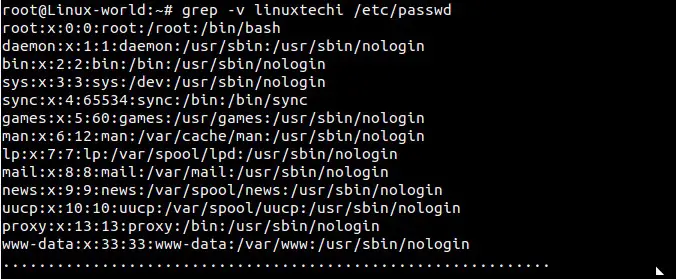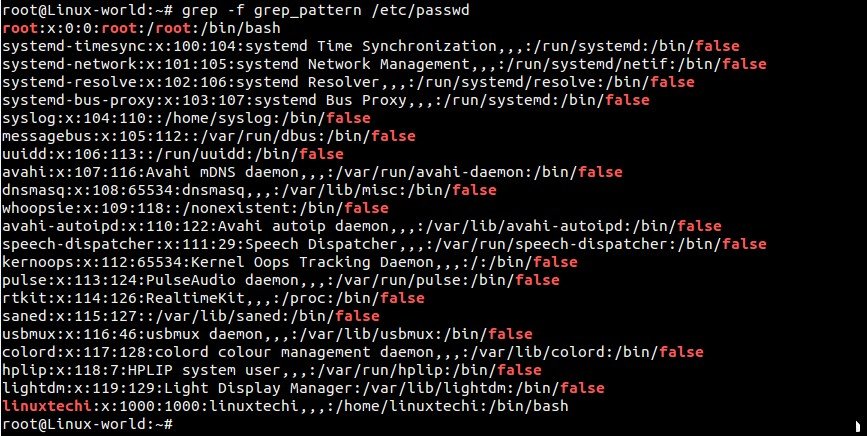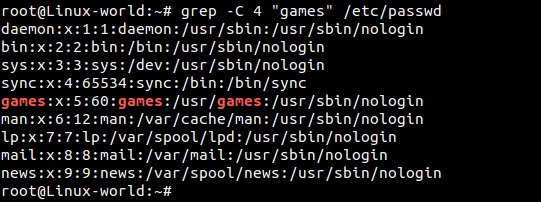mirror of
https://github.com/LCTT/TranslateProject.git
synced 2025-01-04 22:00:34 +08:00
175 lines
6.9 KiB
Markdown
175 lines
6.9 KiB
Markdown
|
|
Linux grep command with 14 different examples
|
|||
|
|
================================================================================
|
|||
|
|
### Overview : ###
|
|||
|
|
|
|||
|
|
Linux like operating system provides a searching tool known as **grep (global regular expression print)**. grep command is useful for searching the content of one more files based on the pattern. A pattern may be a single character, bunch of characters, single word or a sentence.
|
|||
|
|
|
|||
|
|
When we execute the grep command with specified pattern, if its is matched, then it will display the line of file containing the pattern without modifying the contents of existing file.
|
|||
|
|
|
|||
|
|
In this tutorial we will discuss 14 different examples of grep command
|
|||
|
|
|
|||
|
|
### Example:1 Search the pattern (word) in a file ###
|
|||
|
|
|
|||
|
|
Search the “linuxtechi” word in the file /etc/passwd file
|
|||
|
|
|
|||
|
|
root@Linux-world:~# grep linuxtechi /etc/passwd
|
|||
|
|
linuxtechi:x:1000:1000:linuxtechi,,,:/home/linuxtechi:/bin/bash
|
|||
|
|
root@Linux-world:~#
|
|||
|
|
|
|||
|
|
### Example:2 Search the pattern in the multiple files. ###
|
|||
|
|
|
|||
|
|
root@Linux-world:~# grep linuxtechi /etc/passwd /etc/shadow /etc/gshadow
|
|||
|
|
/etc/passwd:linuxtechi:x:1000:1000:linuxtechi,,,:/home/linuxtechi:/bin/bash
|
|||
|
|
/etc/shadow:linuxtechi:$6$DdgXjxlM$4flz4JRvefvKp0DG6re:16550:0:99999:7:::/etc/gshadow:adm:*::syslog,linuxtechi
|
|||
|
|
/etc/gshadow:cdrom:*::linuxtechi
|
|||
|
|
/etc/gshadow:sudo:*::linuxtechi
|
|||
|
|
/etc/gshadow:dip:*::linuxtechi
|
|||
|
|
/etc/gshadow:plugdev:*::linuxtechi
|
|||
|
|
/etc/gshadow:lpadmin:!::linuxtechi
|
|||
|
|
/etc/gshadow:linuxtechi:!::
|
|||
|
|
/etc/gshadow:sambashare:!::linuxtechi
|
|||
|
|
root@Linux-world:~#
|
|||
|
|
|
|||
|
|
### Example:3 List the name of those files which contain a specified pattern using -l option. ###
|
|||
|
|
|
|||
|
|
root@Linux-world:~# grep -l linuxtechi /etc/passwd /etc/shadow /etc/fstab /etc/mtab
|
|||
|
|
/etc/passwd
|
|||
|
|
/etc/shadow
|
|||
|
|
root@Linux-world:~#
|
|||
|
|
|
|||
|
|
### Example:4 Search the pattern in the file along with associated line number(s) using the -n option ###
|
|||
|
|
|
|||
|
|
root@Linux-world:~# grep -n linuxtechi /etc/passwd
|
|||
|
|
39:linuxtechi:x:1000:1000:linuxtechi,,,:/home/linuxtechi:/bin/bash
|
|||
|
|
root@Linux-world:~#
|
|||
|
|
|
|||
|
|
root@Linux-world:~# grep -n root /etc/passwd /etc/shadow
|
|||
|
|
|
|||
|
|

|
|||
|
|
|
|||
|
|
### Example:5 Print the line excluding the pattern using -v option ###
|
|||
|
|
|
|||
|
|
List all the lines of the file /etc/passwd that does not contain specific word “linuxtechi”.
|
|||
|
|
|
|||
|
|
root@Linux-world:~# grep -v linuxtechi /etc/passwd
|
|||
|
|
|
|||
|
|

|
|||
|
|
|
|||
|
|
### Example:6 Display all the lines that starts with specified pattern using ^ symbol ###
|
|||
|
|
|
|||
|
|
Bash shell treats carrot symbol (^) as a special character which marks the beginning of line or a word. Let’s display the lines which starts with “root” word in the file /etc/passwd.
|
|||
|
|
|
|||
|
|
root@Linux-world:~# grep ^root /etc/passwd
|
|||
|
|
root:x:0:0:root:/root:/bin/bash
|
|||
|
|
root@Linux-world:~#
|
|||
|
|
|
|||
|
|
### Example: 7 Display all the lines that ends with specified pattern using $ symbol. ###
|
|||
|
|
|
|||
|
|
List all the lines of /etc/passwd that ends with “bash” word.
|
|||
|
|
|
|||
|
|
root@Linux-world:~# grep bash$ /etc/passwd
|
|||
|
|
root:x:0:0:root:/root:/bin/bash
|
|||
|
|
linuxtechi:x:1000:1000:linuxtechi,,,:/home/linuxtechi:/bin/bash
|
|||
|
|
root@Linux-world:~#
|
|||
|
|
|
|||
|
|
Bash shell treats dollar ($) symbol as a special character which marks the end of line or word.
|
|||
|
|
|
|||
|
|
### Example:8 Search the pattern recursively using -r option ###
|
|||
|
|
|
|||
|
|
root@Linux-world:~# grep -r linuxtechi /etc/
|
|||
|
|
/etc/subuid:linuxtechi:100000:65536
|
|||
|
|
/etc/group:adm:x:4:syslog,linuxtechi
|
|||
|
|
/etc/group:cdrom:x:24:linuxtechi
|
|||
|
|
/etc/group:sudo:x:27:linuxtechi
|
|||
|
|
/etc/group:dip:x:30:linuxtechi
|
|||
|
|
/etc/group:plugdev:x:46:linuxtechi
|
|||
|
|
/etc/group:lpadmin:x:115:linuxtechi
|
|||
|
|
/etc/group:linuxtechi:x:1000:
|
|||
|
|
/etc/group:sambashare:x:131:linuxtechi
|
|||
|
|
/etc/passwd-:linuxtechi:x:1000:1000:linuxtechi,,,:/home/linuxtechi:/bin/bash
|
|||
|
|
/etc/passwd:linuxtechi:x:1000:1000:linuxtechi,,,:/home/linuxtechi:/bin/bash
|
|||
|
|
............................................................................
|
|||
|
|
|
|||
|
|
Above command will search linuxtechi in the “/etc” directory recursively.
|
|||
|
|
|
|||
|
|
### Example:9 Search all the empty or blank lines of a file using grep ###
|
|||
|
|
|
|||
|
|
root@Linux-world:~# grep ^$ /etc/shadow
|
|||
|
|
root@Linux-world:~#
|
|||
|
|
|
|||
|
|
As there is no empty line in /etc/shadow file , so nothing is displayed.
|
|||
|
|
|
|||
|
|
### Example:10 Search the pattern using ‘grep -i’ option. ###
|
|||
|
|
|
|||
|
|
-i option in the grep command ignores the letter case i.e it will ignore upper case or lower case letters while searching
|
|||
|
|
|
|||
|
|
Lets take an example , i want to search “LinuxTechi” word in the passwd file.
|
|||
|
|
|
|||
|
|
nextstep4it@localhost:~$ grep -i LinuxTechi /etc/passwd
|
|||
|
|
linuxtechi:x:1001:1001::/home/linuxtechi:/bin/bash
|
|||
|
|
nextstep4it@localhost:~$
|
|||
|
|
|
|||
|
|
### Example:11 Search multiple patterns using -e option ###
|
|||
|
|
|
|||
|
|
For example i want to search ‘linuxtechi’ and ‘root’ word in a single grep command , then using -e option we can search multiple patterns .
|
|||
|
|
|
|||
|
|
root@Linux-world:~# grep -e "linuxtechi" -e "root" /etc/passwd
|
|||
|
|
root:x:0:0:root:/root:/bin/bash
|
|||
|
|
linuxtechi:x:1000:1000:linuxtechi,,,:/home/linuxtechi:/bin/bash
|
|||
|
|
root@Linux-world:~#
|
|||
|
|
|
|||
|
|
### Example:12 Getting Search pattern from a file using “grep -f” ###
|
|||
|
|
|
|||
|
|
First create a search pattern file “grep_pattern” in your current working directory. In my case i have put the below contents.
|
|||
|
|
|
|||
|
|
root@Linux-world:~# cat grep_pattern
|
|||
|
|
^linuxtechi
|
|||
|
|
root
|
|||
|
|
false$
|
|||
|
|
root@Linux-world:~#
|
|||
|
|
|
|||
|
|
Now try to search using grep_pattern file.
|
|||
|
|
|
|||
|
|
root@Linux-world:~# grep -f grep_pattern /etc/passwd
|
|||
|
|
|
|||
|
|

|
|||
|
|
|
|||
|
|
### Example:13 Count the number of matching patterns using -c option ###
|
|||
|
|
|
|||
|
|
Let take the above example , we can count the number of matching patterns using -c option in grep command.
|
|||
|
|
|
|||
|
|
root@Linux-world:~# grep -c -f grep_pattern /etc/passwd
|
|||
|
|
22
|
|||
|
|
root@Linux-world:~#
|
|||
|
|
|
|||
|
|
### Example:14 Display N number of lines before & after pattern matching ###
|
|||
|
|
|
|||
|
|
a) Display Four lines before patten matching using -B option
|
|||
|
|
|
|||
|
|
root@Linux-world:~# grep -B 4 "games" /etc/passwd
|
|||
|
|
|
|||
|
|

|
|||
|
|
|
|||
|
|
b) Display Four lines after pattern matching using -A option
|
|||
|
|
|
|||
|
|
root@Linux-world:~# grep -A 4 "games" /etc/passwd
|
|||
|
|
|
|||
|
|

|
|||
|
|
|
|||
|
|
c) Display Four lines around the pattern matching using -C option
|
|||
|
|
|
|||
|
|
root@Linux-world:~# grep -C 4 "games" /etc/passwd
|
|||
|
|
|
|||
|
|

|
|||
|
|
|
|||
|
|
--------------------------------------------------------------------------------
|
|||
|
|
|
|||
|
|
via: http://www.linuxtechi.com/linux-grep-command-with-14-different-examples/
|
|||
|
|
|
|||
|
|
作者:[Pradeep Kumar][a]
|
|||
|
|
译者:[译者ID](https://github.com/译者ID)
|
|||
|
|
校对:[校对者ID](https://github.com/校对者ID)
|
|||
|
|
|
|||
|
|
本文由 [LCTT](https://github.com/LCTT/TranslateProject) 原创翻译,[Linux中国](https://linux.cn/) 荣誉推出
|
|||
|
|
|
|||
|
|
[a]:http://www.linuxtechi.com/author/pradeep/
|